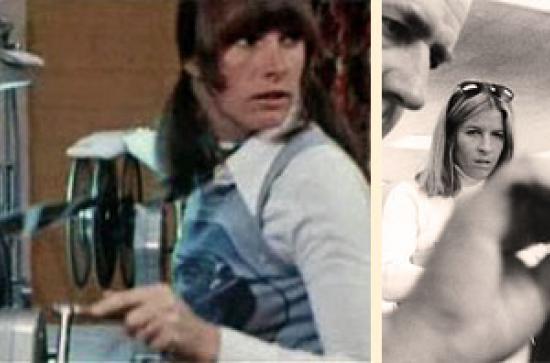
Recent decades have witnessed no shortage of critical or academic writing on the industrial upheaval and creative innovations of New Hollywood (1967-80). But as scholarship has shaped the era, it has done so around a very narrow set of concerns, the overriding one casting New Hollywood as an era of great directors, which, by default, has meant an era of “great men.” Such a vision relies on the kind of identification of creativity with masculinity that Geneviève Sellier has discussed in relation to the French New Wave, and its construction has required a marginalisation, erasure even, of the creative labour of countless women practitioners.
In reality, the late ‘60s and ‘70s saw women begin to re-enter Hollywood production in numbers never before seen. While achieving nothing close to real parity, women nevertheless wrote, edited, designed, and produced many of the era’s most influential films. Most of these contributions have been, at best, paid lip service, but more often overlooked almost completely.
For example, one of New Hollywood’s iconic films, Bonnie and Clyde, is regularly recognized for its innovative editing – Dede Allen arguably changed the style of Hollywood filmmaking forever. And yet, Allen is marginalised within discourses that discount women’s contributions and privilege the roles of men like Arthur Penn and Warren Beatty.
Media Studies at Maynooth University and the Irish Research Council are happy to announce the conference Women and New Hollywood, to be held at Maynooth Unversity on 29-30 May, 2018.
The conference will endeavour to excavate and reassess the various roles that women’s creative labour played in shaping the New Hollywood era across all facets of production and within the broader cultural context. We hope to challenge the dominant discourse around New Hollywood, which is, among other things, heavily gendered in its bias towards a creativity, an innovation, and a labour that continue to be framed as almost entirely male.
To that end we invite proposals on any aspect of Women and New Hollywood, including but not limited to:
women practitioners – analysing the work of specific editors, designers, directors, writers, producers, etc.;
how the work of particular women of the ‘70s has influenced later Hollywood filmmakers;
actors behind the camera;
women in charge – charting the rise of the first wave of women executives and studio heads and their influence on later eras of Hollywood;
the relationship between women in production and women’s representation on screen;
women’s film criticism during the era;
women, New Hollywood, and second-wave feminism;historiography & institutional memory – how contemporary institutions such as publishers, archives, or film studies departments perpetuate or challenge the marginalisation of New Hollywood women;
theorizing the ‘70s – through a contemporary lens or by revisiting ‘70s feminist theory.
Furthermore, while the main topic of the conference is Hollywood filmmaking, we recognize that artistic women have often been impelled to work across creative spheres. So we are also open to proposals on the following, especially where links can be made to the conference’s main topic:
independent women filmmakers;
women in television;
women working in other national film industries.
We are accepting submissions for individual papers or pre-constituted panels of three papers each. In either case, please include abstracts of no more than 300 words and brief biographies for each presenter (100 words). Pre-constituted panels should also include a brief rationale statement (250 words). In keeping with the spirit of the conference, we would like to discourage all-male panels. Proposals should be submitted in one email to [email protected] by 20 December 2017. Participants will be notified by the selection committee before the end of January 2018.
Further queries can be directed to the email address above or to one of the conference organizers: Aaron Hunter ([email protected]) or Martha Shearer ([email protected]).
Maynooth is a university town, located approximately 30 minutes by train from Dublin city centre. It is home to a historic castle, the Duke of Leinster’s former estate, and lively pubs and restaurants. Accommodation will be available on campus and in local hotels.
